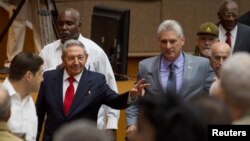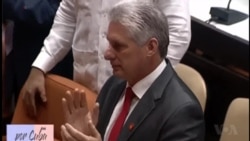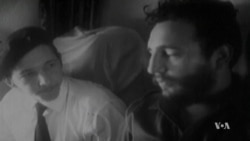Miguel Diaz-Canel has been named Cuba's next president, marking the first time in 60 years the communist-run country has had a president outside the Castro family.
The 57-year-old Diaz-Canel, the only candidate for the job, won a five-year term, according to state media.
The move was not expected to usher in drastic change. Upon being sworn in Thursday, Diaz-Canel promised to continue the Castros' socialist revolution.
WATCH: US-Cuba Relations Unchanged Under New Cuban President
"The mandate given by the people to this house is to give continuity to the Cuban revolution in a crucial historic moment," Diaz-Canel said.
Diaz-Canel, a former first vice president, appears to be socially liberal and is considered an acceptable successor to the retiring elderly leaders who fought in the revolution.
He succeeds 86-year-old Raul Castro, who is resigning after 10 years in office. Raul Castro's late brother, Fidel, served as prime minister and president after the armed Cuban Revolution in 1959 until he became ill in 2006.
While the leadership transition is elevating younger leaders, Raul Castro and other older revolutionaries are expected to retain their power, due to their hold on the Communist Party. Castro will remain party leader.
"Raul Castro, as first secretary of the Communist Party, will lead the decisions about the future of the country,'' Diaz-Canel said in his speech. "Cuba needs him, providing ideas and proposals for the revolutionary cause, orienting and alerting us about any error or deficiency, teaching us, and always ready to confront imperialism.''
Castro told members of the National Assembly that Diaz-Canel could serve two years as president, and that he will likely eventually take his place as head of the Communist Party.
Diaz-Canel will face pressure to bring greater prosperity to the Caribbean country and revitalize its economy, which is weaker than it was in 1985 when it was supported by the former Soviet Union.
Since Fidel and Raul Castro led a guerrilla movement that overthrew a dictatorship and took over the country in 1959, the name Castro has been synonymous with Cuba. The Castros leave behind a history of defiance against the United States, as well as a long record of oppression.
The Castros' human rights legacy is one of authoritarianism, says Andrew Otazo of the Cuba Study Group, pointing out that the country does not grant freedom of assembly or freedom of the press, and does not allow democratic elections. He expects little to change in the near future.
"We will see how things turn out within the medium term, but I do not see a big groundswell of support within the Cuban government for expanding human rights, for instance," said Otazo.
WATCH: As Raul Castro Steps Aside, a New Era for Cuba
State Department spokeswoman Heather Nauert said the leadership transition is "of great concern" to the Trump administration because it is not democratic.
"We would like citizens to be able to have a say in their political outcomes, and this certainly does not seem like regular folks will have a say. They basically don't have a real and meaningful choice because it's not a democratic process."
Nauert said the administration would like to see "a more free and democratic Cuba," but is "not overly optimistic."
Ileana Ros-Lehtinen, a Republican U.S. representative from Florida and Cuban American, echoed similar sentiments.
"It may be that Castro's name is not going to appear as president, but they were never presidents, neither Fidel nor Raul, because they are dictators," said Ros-Lehtinen. "As long as the people of Cuba do not have the opportunity to choose their own government, it is always going to be a dictatorship, no matter who is the head of that government."
VOA's Spanish Service contributed to this report.








